The Ultimate Guide to Becoming A Digital Nomad Family
Want to become a digital nomad family but don’t know where to start?
Most people assume that becoming a digital nomad is something that is only possible for childless millennials. However, we’re here to tell you that it’s totally possible to be a digital nomad family with your kids and pets.
We’ve been travelling part time with our toddler and baby as a digital nomad family for the last 3 years. We love the nomadic lifestyle as it’s given us the chance to visit some amazing countries along the way. As part of the digital nomad lifestyle we’ve learnt a lot. From how to find local schools, how to make friends along the way and how to make sure that you have a great work-life balance. Join us as we tell you more about how to become a digital nomad family.
What is a digital nomad family?
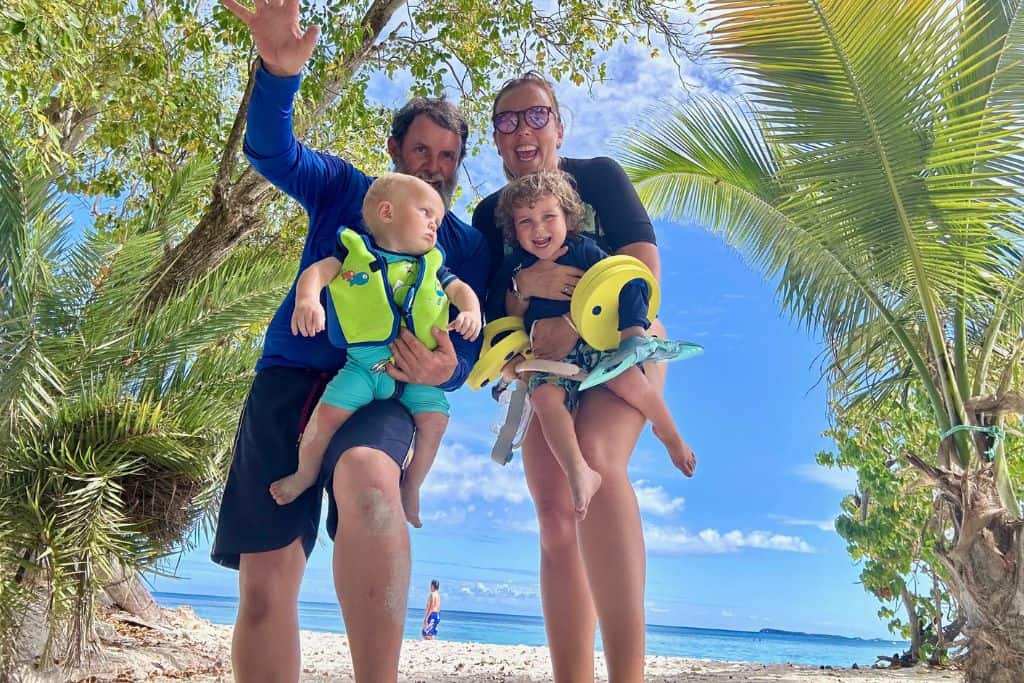
The general definition of a digital nomad describes people travelling from place to place who continue to work remotely. They have a way of earning an income which doesn’t require them to be in a physical location. This allows them to choose the location that they work from.
A digital nomad family extends the concept of the digital nomad to include children. And often includes an extra parent who may or may not work. Usually one or both of the parents have a job which isn’t location-specific. This allows them the freedom to move around the world as and when they desire. Their children would either be pre-school age, be happy to be schooled online or by their parents (homeschooled), or attend a school in the place they’re currently living.
By blending their work and travel, these digital nomad families create unique opportunities for their children to learn about different cultures, languages, and ways of life. With the right planning and organisation, it is possible to create a harmonious balance between work and family life while exploring the world together.
The concept of a digital nomad family has become more commonplace recently. It’s been particularly driven by an increase in remote working opportunities for parents. There are now also communities online devoted to providing details on online learning options for school-aged children. Being a digital nomad isn’t just an option for those without kids. What was once a pipe dream for most is becoming a reality!
What do digital nomads do for work?
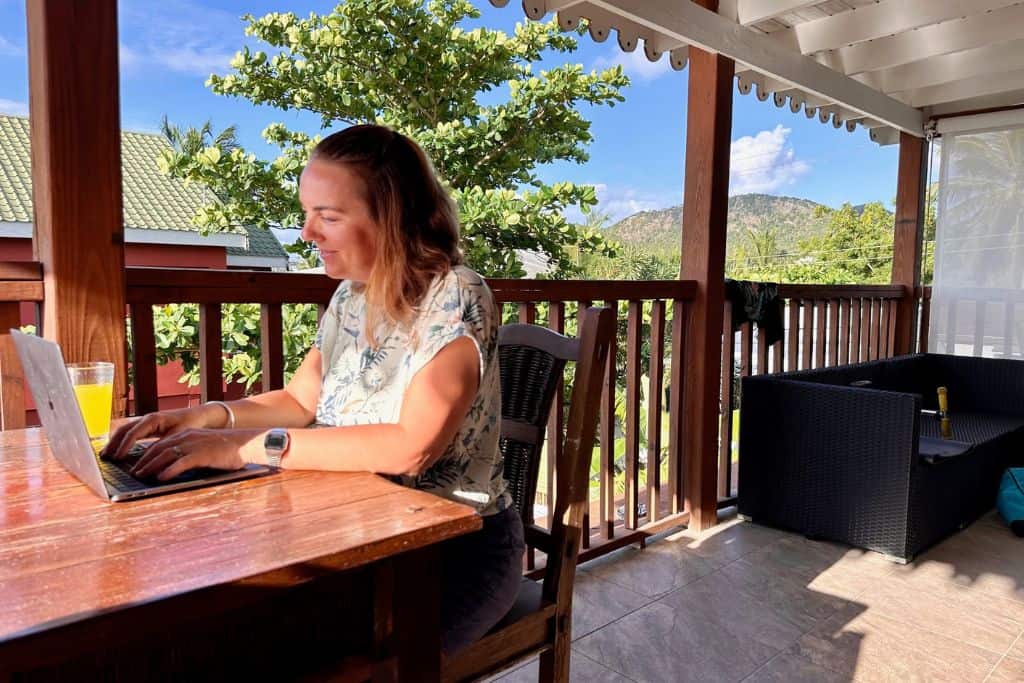
The list of potential jobs that digital nomad parents might have is huge. And growing fast as more companies become open to offering remote work post pandemic. There’s a myth that you have to be self-employed or a freelancer to be able to be a digital nomad. This isn’t true anymore, and I’m an example of that as I’m employed at a tech start-up. What is true, is that it must be remote based and not rely on you being in a physical location or having to have face-to-face meetings. Depending on the terms of the remote work, it might be that there is a requirement to visit the office on an annual basis.
One of the most common categories is travel bloggers. However, you need to make sure it’s already an established business generating an income. That’s because it’s not something you can set up and monetise within a few weeks. Although we have a travel blog, we actually don’t earn an income from it (yet!). I work in a sales team for a tech start-up which allows me to follow a digital nomad lifestyle, and Carl works as a yacht captain. Carl’s job doesn’t technically fall under the digital nomad category. He’s classed as a seasonal worker, but more on that later!
Digital nomad work ideas
We’ve met many digital nomads on our travels and here’s a list of some of the roles that they’ve had:
- travel blogger (like us!)
- software developers, UX designers
- accountants
- writers, editors & translators
- virtual assistants
- consultants
- language teachers
- travel agent
- marketing & sales agents
- anything your boss allowed you to do “from home”
Many, many other jobs have the potential to be remote and allow you to become a digital nomad family. It really depends on your company and how keen they are to allow the move. Some companies, like the one I work for, have digital nomad work policies. If one of you is struggling to organise remote work, then the option of parental leave. This is available to all employees in the UK for four weeks per child per year. It could be a good idea, however, it’s important to know that it is unpaid.
Our experience as a digital nomad family
How we became a digital nomad family
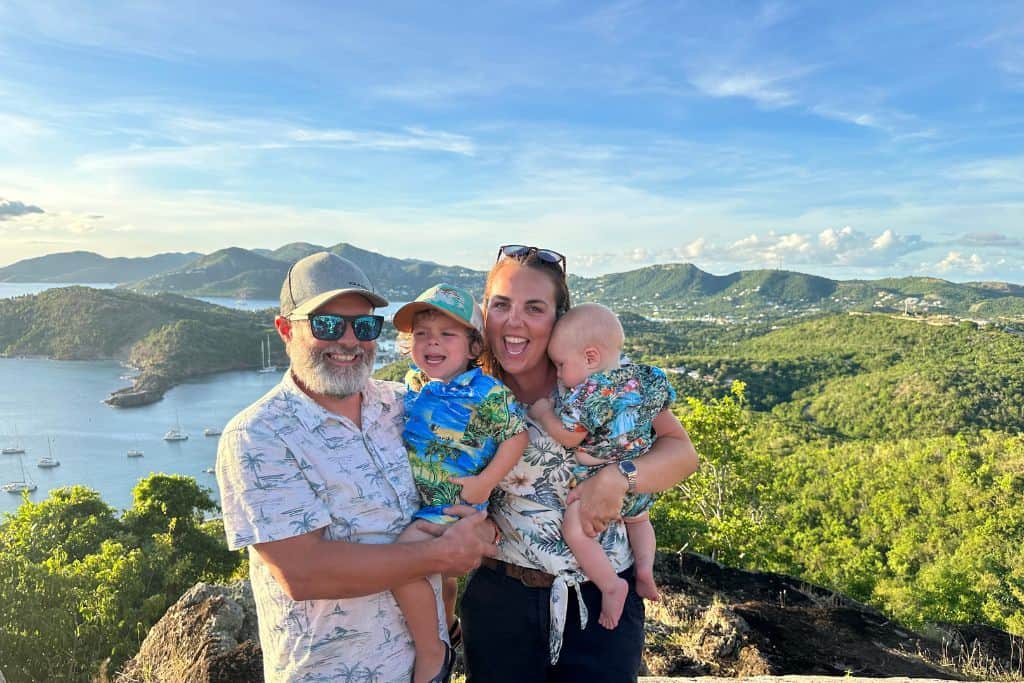
The funny thing is that we accidentally fell into the being a digital nomad family. Carl has always worked as a yacht captain sailing around the world. Before we had the boys I’d regularly hop on a flight and spend a week or two out with Carl as he travelled around. And occasionally he’d pop back to the UK. Our sporadic life pre-kids was fun and exciting, and we knew that we didn’t want to limit ourselves if we had children.
At the time I was a spa director for a large luxury hotel in the UK. Then the pandemic hit, and we were excited to discover I was pregnant. We knew that we needed to find a way that I could travel out to Carl with our soon-to-be baby so that we could travel as a family.
I had a lot of transferable skills and secured myself a role in the sales team for a tech start-up, straight up, I explained our family situation. It helped that the owners were both avid sailors and knew that I was keen to follow Carl around the world with Cameron. I work part-time for them doing 3 days a week. When I’m abroad I flex my hours to make sure they work for the business needs. For example, in Antigua, I work early mornings five days a week. This means that I’m still able to log on during UK work hours.
Why we aren’t a full time digital nomad family
I think it’s important to add, that we don’t travel full time. This is because we really love our time back in the UK to see our friends and family. We find that this helps with making sure that the boys don’t miss our friends and family at home. We spend roughly 6 months of the year following a digital nomad family life.
Living our digital nomad family life in Antigua
We’ve spent the last 3 winters living in Antigua, and digital nomad family life has worked very well for us. Cameron who is now 3 years old goes to the local pre-school there and has made some incredible friendships. And Dylan our youngest has a fantastic nanny who cares for him. We’ve also made lots of lasting friendships as a family by chatting to other families on the beach. The same families return each winter and we look forward to catching up with them. Carl is fortunate that he’s able to start work early in the morning and we generally have the afternoons together as a family. A few evenings in the week Carl goes back to the boat to socialise with the guests onboard. To make the work-life balance work, we’ve really focussed on making our timings work.
Our European digital nomad family travels
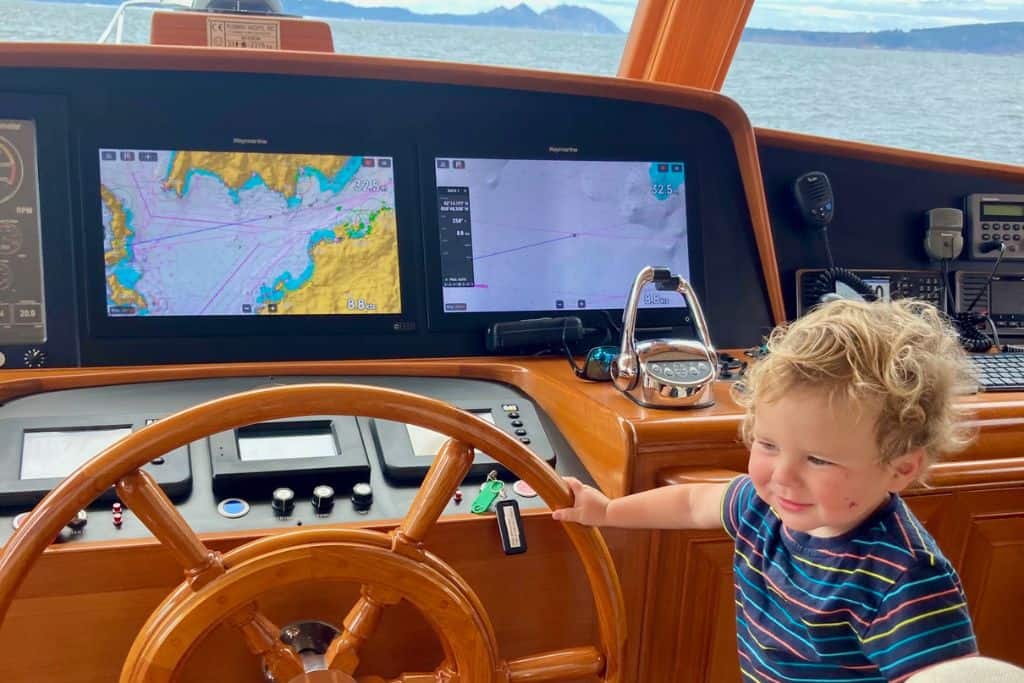
In the summers we are based out of our home in Hamble in the UK and travel around Europe. Sometimes for just a few weeks at a time as Carl takes shorter temporary contracts. We once spent 6 weeks in Baiona in Spain whilst Carl worked, at the time we only had Cam to look after. To make it work as we couldn’t find a local pre-school, I’d start work each day at 5:30 am and get my work done early whilst Carl looked after Cam. I’d finish at 10:30 am and then Carl would start work whilst I would look after Cameron. Then in the early afternoon Carl would finish for the day and we’d then go hang out as a family. It’s not always easy, however, we wouldn’t change a thing as we love our nomadic family lifestyle.
Looking after our family dog
We also at home have our wonderful dog, Cavendish who is a black lurcher. When we do away we also have to make sure that he is taken care of. When we first started to follow a nomadic lifestyle Cav would go for holidays at our friends’ houses whilst we travelled. Then we had a housemate come to live with us (thank you Abby). However, to make things easier for Cav as he’s getting older, we either have our friends to stay over at our house. Or, we use a fantastic website called Trust Housesitters.
We’ve not taken Cav with us on any of our adventures. This is because he’s an older dog and he’s not too keen on car travel and it makes him anxious. Because of this, we don’t want to put him through the potential stress of taking the flight to Antigua. We do, however, have friends who bring their dog to Antigua each winter which works really well for them.
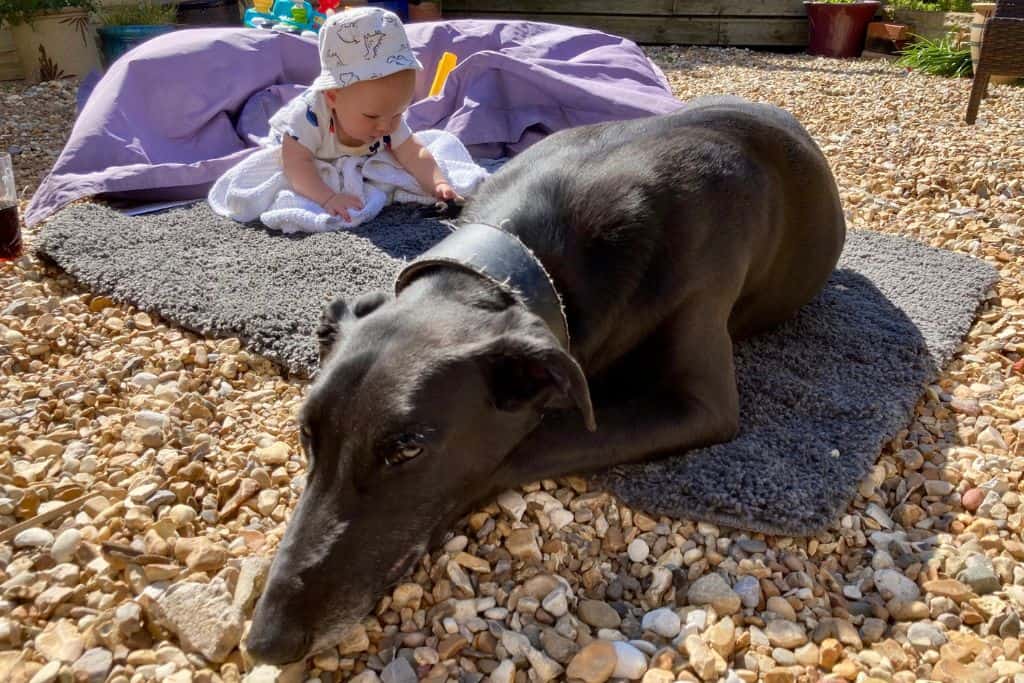
Benefits of being a digital nomad family
A nomad lifestyle on the road is an intense, invigorating and memorable way to live as a family. One of the fantastic benefits of a digital nomad family life is the opportunity to live in a new country. You can experience slow travelling, and moving around as and when you want to. If you fall in love with one place, you’re free to set up camp and immerse yourselves fully into that community. On the other hand, if a place isn’t ticking all the right boxes, you can pack your bags and head off for somewhere new.
For the parents, the world is now your office, and you’re able to combine experiencing it with your remote work. I’ve always found that work is more enjoyable when you’re relaxed and enjoying life. For me, this comes from the excitement of being away from your usual home country. The days go quicker and the weekends are way more fun as you explore your new home from home.
For kids, there are lots advantages to living a nomadic lifestyle. These range from seeing more of the world, learning a new language, meeting people from different cultures. Along with increased flexibility and adaptability. Also, they are getting an education that goes beyond the standard curriculum.
For the entire family, it’s the chance to spend quality time together enjoying a different experience to the norm of your home country. All while visiting different countries together. We love our family time!
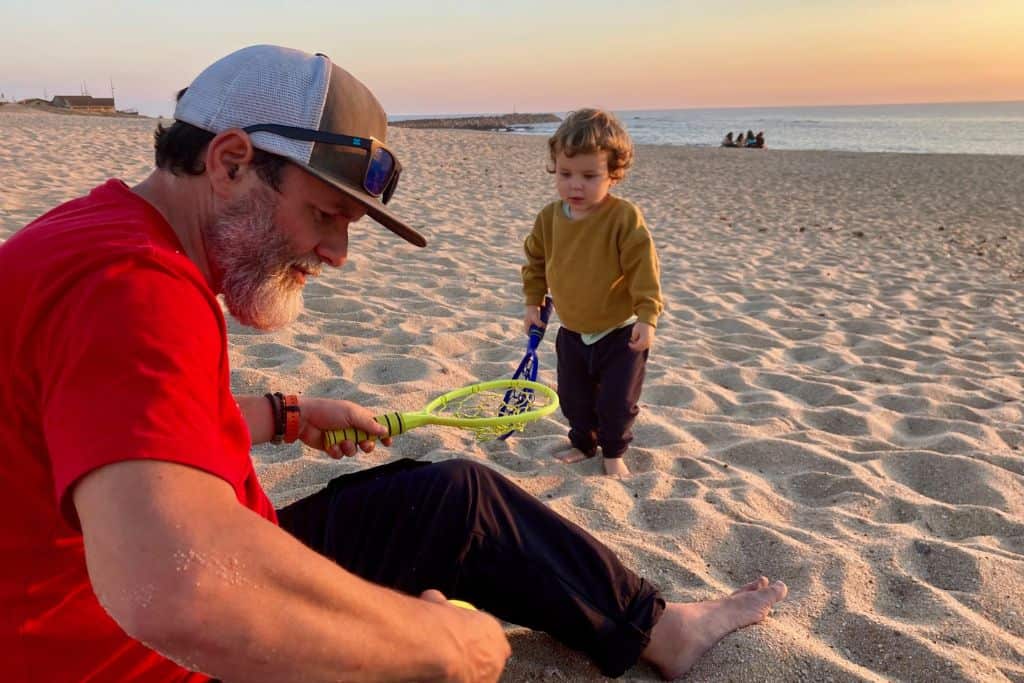
Challenges faced by digital nomad families
Very few things in life are without their challenges, and digital nomad family life is no exception to this. Whilst we believe that for us the positives far outweigh the negatives, there are still some downsides that you should consider when planning to start a nomadic lifestyle.
For both the parents and the kids, it can be very difficult saying goodbye to friends and family back home. If you have no fixed timetable or plans, you might not know when you’ll be back home again permanently. And as your kids get older, their attachments to school friends get ever stronger. In the past we’ve met families where there has been some resistance to leaving their friends behind. This is why, as we know from experience, it’s easier to travel with babies and younger kids. Because they are less inclined to miss friends back home. Once you’re on the road, friendships can be harder to form, as you might only stay still for a few weeks before moving on.
If you have any pets at home, you’ll either need to arrange for someone to look after them or perhaps consider taking them with you.
Planning ahead things to consider
There is a lot to plan and consider before making the change to becoming digital nomads. We’ve tried to cover as many of them as possible for you. Yo’ll have a lot of research to do, however, hopefully, these help to kick-start your planning.
Legal aspects of digital nomad life visas and tax
Visas and right to work
To legally work in any country, you need to make sure that you have the legal right to work there and/or a valid visa.. With regards to visas, digital nomads are a relatively recent phenomenon. And it’s taking a while for governments around the world to catch up and offer applicable visas. The good news is that and ever increasing number of countries are recognising the value of digital nomads to their economy so they are creating specific visas for them. For most of them, as long as you can prove past earnings in an applicable field, and have enough funds, insurance, etc, you’re in a good position to be approved.
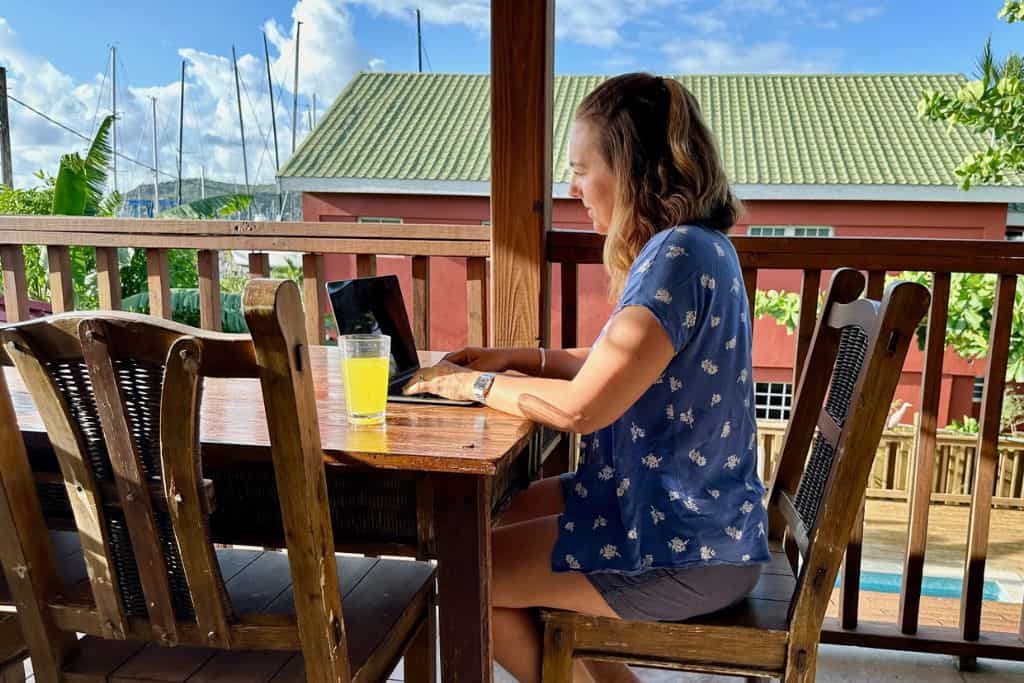
Once you have the digital nomad visa, you can legally live and work in that country and have access to some other benefits of residency, including healthcare, schooling, opening bank accounts, etc. Some countries, such as Malaysia with are at the forefront, and have a dedicated organisation set up to process and advise on the applications. Others can be more challenging to secure. We’d advise making sure that you give the application process plenty of time. It might even be that you need to work with a specialist agency. Definitely make sure you have you visa before making plans to leave for your adventure.
The list of countries is growing and includes tempting locations such as Antigua, Portugal, Thailand, St Lucia and Cyprus. And we can imagine that more are likely to join the club over time as the benefits become even clearer.
Tax
This is definitely one area you should get specialist advice on, as this will vary depending on your own circumstances. Typical elements to consider include where you’ll be living, and where you originally call home.
In more general terms, you’ll find that the amount of tax you’ll owe in any country largely depends on where you’ve generated your income, and how long you spend in the country. The UK where we are from, for example, has a double-tax treaty with many other countries. This stops you from paying tax twice on the same income. However, as we already mentioned, you should speak to an expert on international tax rules and follow their guidance on this.
Health and travel insurance
You’ll definitely need to have some sort of health insurance cover. You’ll need to make sure that it’s comprehensive and covers you for your time away. We’ve had friends whose kids have been unwell and needed hospital stays. They were grateful for their travel insurance as it covered some pretty hefty medical bills.
Researching family-friendly locations
When you start to consider where to go you’ll want to research family-friendly locations as a digital nomad family. With this in mind, it’s important to consider factors such as safety, healthcare facilities, and availability of activities and facilities suitable for children. For instance, we always think about how we’ll find new friends for Cameron. Look for places that have family-oriented communities, access to parks or recreational activities, and some good educational options for your children. You’ll also need to prioritise areas that have reliable internet connectivity and infrastructure that with caters to you remote work needs.
Popular digital nomad destinations include places such as Bali, Chiang Mai, or Lisbon. Thats’s because they often offer family-friendly environments with support networks and activities for kids.
How will your kids make friends?
This may not matter as much for very young children. However, for school-aged kids and teens they are likely to want more lasting friendships. Transitioning to the digital nomad lifestyle can also be challenging when the kids have to leave their friends behind.
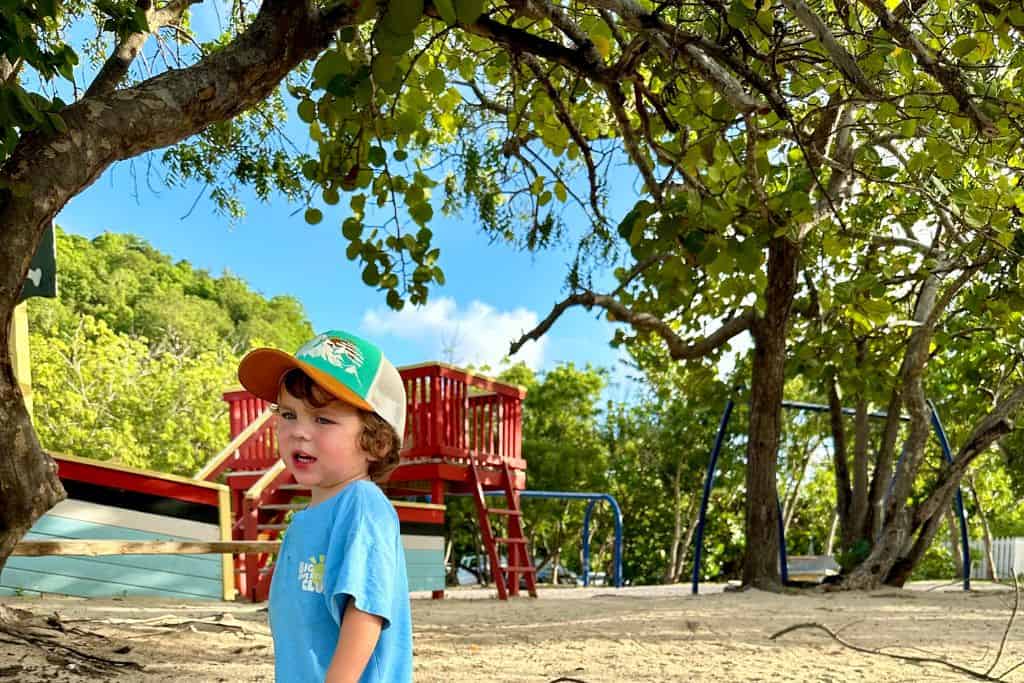
For Cameron, we make sure to visit local beaches or play areas and to interact with other families. In Antigua this is really easy as we researched the most popular family friendly beach in the area and went there a few afternoons in a row. Cam would just head over and play with other kids. After a few days, we noticed the same children on the beach. So, I started to strike up conversation with their parents and we made friends that way. Maybe your kids have a particular sport or activity that they enjoy that they can continue on their travel. Cam loves trying to play tennis so we take him to tennis lessons wherever we are and he meets new friends at classes whilst I get to chat to and meet the parents.
How will you handle language barriers?
Language barriers shouldn’t stop you and your family from experiencing new places. The nomadic lifestyle offers an amazing opportunity to learn new languages through immersion. This is especially true if you spend a longer period of time in one country or region. After our 6 weeks in Spain Cameron was happily chatting away with other kids in the play park. He’d greet them with an hola and see them off with a cheery hasta luego. We have Italian friends who arranged English lessons for their 5 year old and 3 year old before they arrived in Antigua. The girls are now enjoying the same pre-school as Cam. Prepping some language skills in advance can make the transition easier, there are lots of great apps to choose from.
Depending on where you are travelling, there are also bilingual schools and nannies that can help.
Considering safety and security
Before we travel we always check the safety of a country. For us, safety isn’t just about crime and political unrest. It also means making sure that we’re aware of any illnesses the country might have. Or, such things as whether they have safe drinking water. In Antigua we always make sure that both boys sleep under mosquito nets and wear kid safe repellent. This is because there are regular issues with Dengue fever, which we want to protect them from.
Finding suitable accommodation
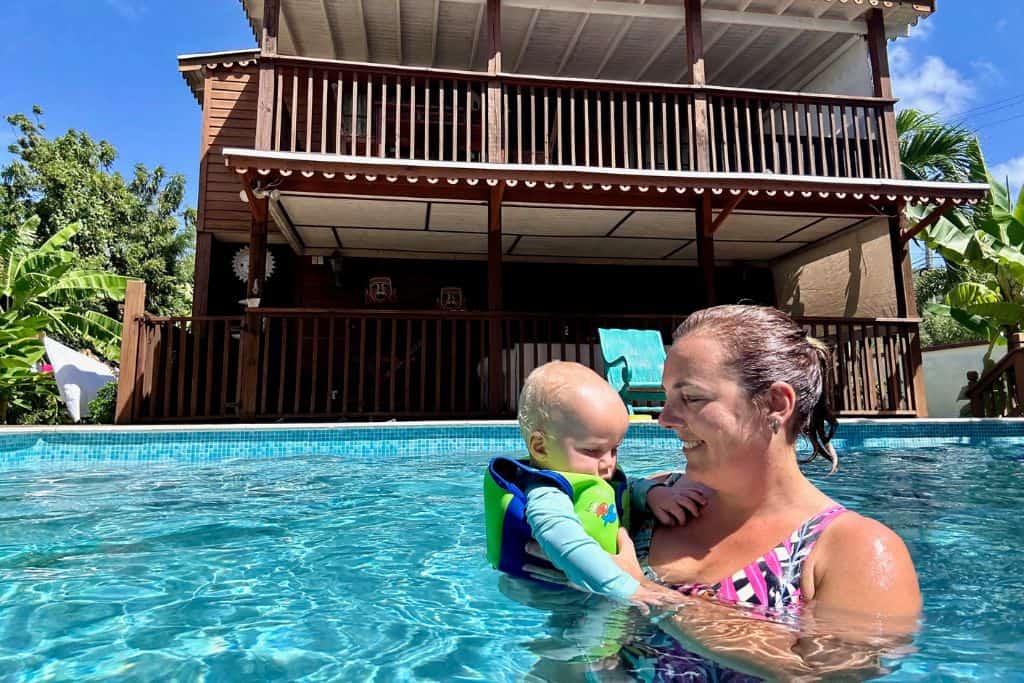
Finding the right accommodation is a key element of planning to become a digital nomad family. You need to make sure that you have a comfortable and functional space that caters to both your work and family needs. Once you’ve decided where to go, you’ll need to decide what sort of accommodation will work for you.
We’ve lived in a variety of different accommodation types that have worked well for where we were, how we were travelling and our budget. In Baiona in Spain we lived in onboard a motor yacht that Carl was skippering as the owner was away. In Eastern Europe we lived in a camper van for a month as we travelled from city to city. And in Antigua we rent a house as we’re there longer and like to have a base with a pool.
When we’ve looked for a house, the best thing we’ve found is to look on sites such as AirBnB. We book our first month through them because this gives us time to arrive to the country. We then look locally for a place to stay longer term which works out cheaper. We’ve also joined local pages on Facebook and asked for recommendations of places to stay.
Some digital nomad families decide to go for a turnkey solution that combines accommodation with communal spaces or co-living options. This allows them to connect with other families and build a supportive community. One of these that we’ve herd of is called Boundless Life. Flexibility is key, as you may want change locations frequently based on your work and travel plans.
Budgeting as a digital nomad family
You need to be prepared that living as a digital nomad isn’t a holiday. As you’ll have to remote work at the same time. For example if you’re living in Portugal you might not be able to afford the expense of visiting huge waterparks and other attractions like you would on a holiday. You need to try to set a daily budget and stick to it so that you don’t overspend. Especially, if like us, you still have the expense of a house in your home country. You’ll find that there really is no need to go sightseeing every day as you would if you were tourists because you need to have a work/school week.
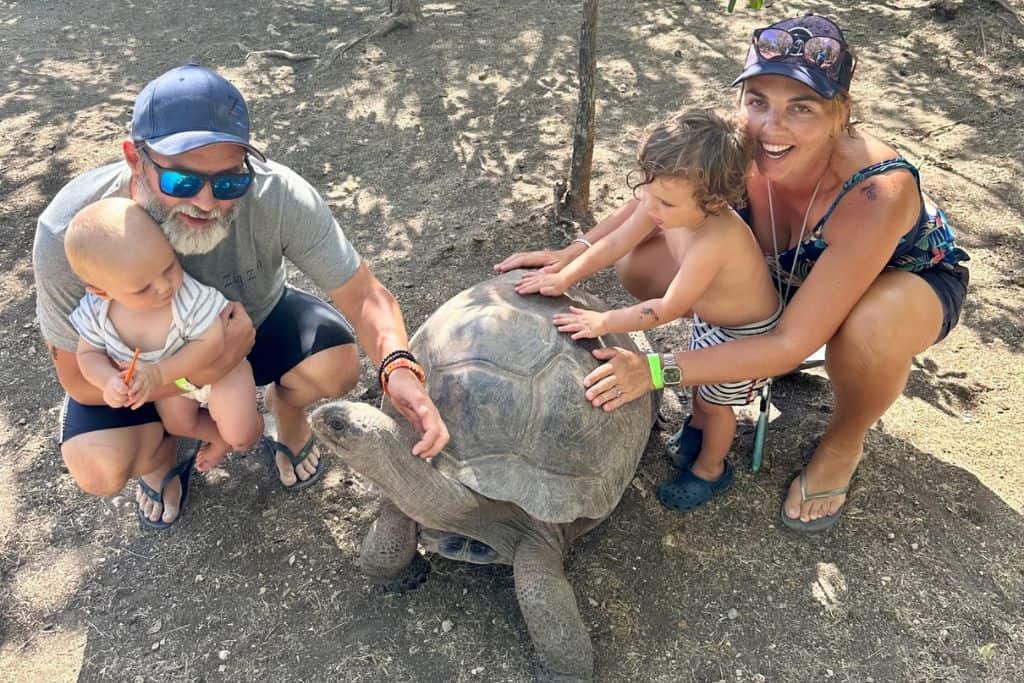
Before you leave you’ll want to have a good idea of the cost of living in the country you plan to stay in. And to be aware of what might cost more or less than you usually expect to pay. For instance, Antigua can be expensive, the cost of nappies for our baby is incredible. We go from paying US$5 for a packet of 50 to paying over US$30. With this in mind, we always pack lots of nappies when we fly over. I think that this is why most people tend to head to countries that are cheaper, such as Bali and Thailand.
We’d also suggest having an emergency fund for when a big expense creeps up on you. You might be driving a camper van and suddenly it has issues and needs some repairs in the garage and you’ll need to have the money to cover these surprise costs.
Education and childcare
This can be one of the biggest stresses and concerns for digital nomad parents. Especially as they start to prepare to make the transition to a nomadic lifestyle with their children. And often move away from a traditional school that they’re used to. Your children’s education is vital, and there’s no reason it should suffer if they’re part of a digital nomad family. It’s amazing as a whole education ecosystem has grown up around travelling families and you now have several options to choose from.
Currently Cameron goes to a local pre-school in Antigua and one in the UK in our home country. When we are in Europe we tend to manage childcare between us and not worry about schooling as he’s only three years old. We’ve been researching options for when he’s older as we fell he’ll need a bit more of a structured approach.
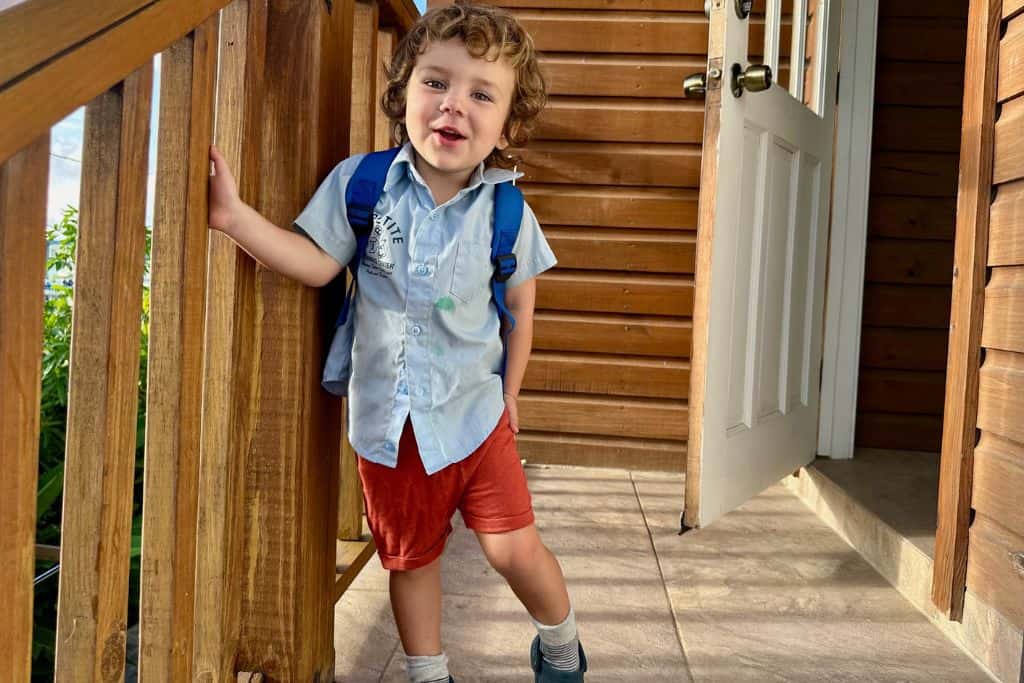
Homeschooling
A lot of families have great results from homeschooling. This is where the parents educate their kids using some form of curriculum along with natural world as their classroom. This definitely works better if one parent has spare time throughout the day to provide the teaching. Although homeschooling can easily fit around more unconventional hours in the early morning and evenings.
Online schooling
Alternatively, if you’re not keen to teach your children the curriculum elements of education a hugely rewarding experience can be had with online classes. This is especially good in places where there’s a decent internet connection and somewhere quiet to work. For many families, it tends to work much better if someone else is doing the teaching. We’re realistic enough to accept that it’s unlikely that either Carl or myself are amazing teachers so online school could be a good option for us.
Worldschooling
This is a more general term for families that teach their children through travelling for typically longer periods of travel time. Some families choose to completely unschool their children. This is where there is no curriculum and the children lead what they’ll learn and they use travel opportunities to learn from. For example they’ll learn history at historical sites and local culture by visiting communities.
It’s possible to have a more group approach so it can worth checking out any worldschooling hubs nearby where you’re going either through online searches or Facebook groups. This is where like-minded families congregate to school their kids with other families. In the right setting, this can be a wonderful way for kids to learn and allows them to build more of a social life especially when they are missing their friends.
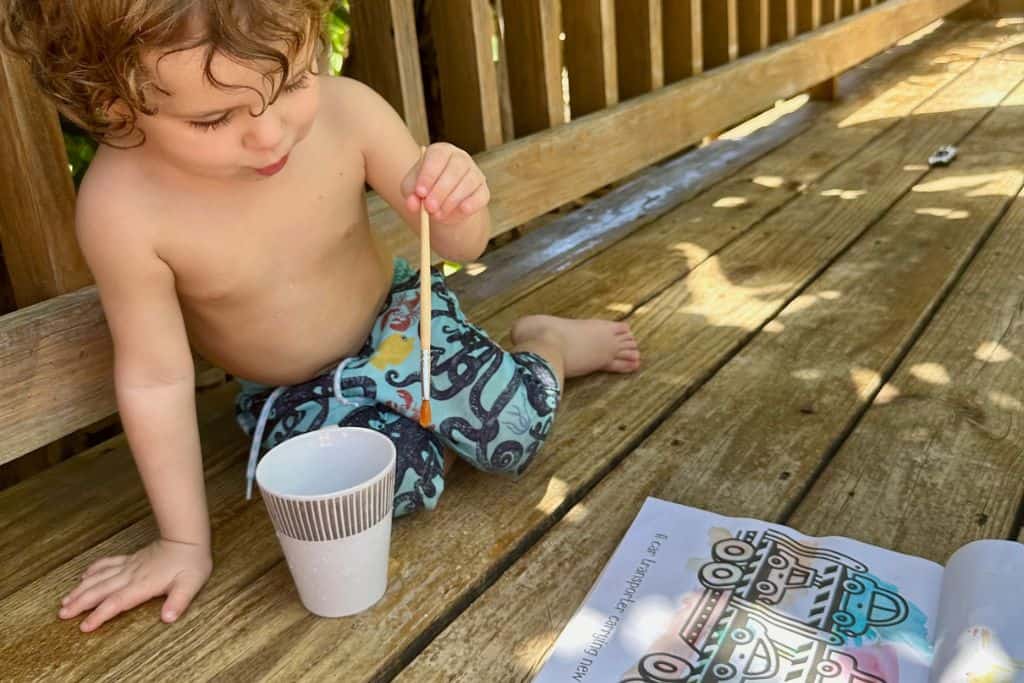
Local or international schools
If you know you’ll be staying somewhere longer, enrolling your kids in either a local or international school is a fantastic option. This is what we do with Cameron in Antigua as he attends a local pre-school. When he needs to start primary education in the UK we plan to enrol Cameron in a local school in Antigua. This is because we’d like him to carry on his schooling there with his friends.
For a more formal approach that might align more with the curriculum of your home country an international school might be a good option. We found the school by asking on a local Facebook group page about where local expat families were sending their kids. We tried two pre-schools before finding one that worked for Cameron.
Nanny
I’m currently on maternity leave which has given me the time to start my travel blog. In Antigua a friend met a cool Canadian girl on the beach called Kathleen who is a nanny and introduced her to us. Kathleen comes to our house twice a week to look after baby Dylan, so I can spend time writing. She also comes a couple of evenings a week to look after both boys so that Carl and I can head out.
During our travels I’ve found that there are various ways to find a nanny to help with childcare. You can search for online agencies which I’ve used before on a business trip to Portugal. Or, local FB groups where I’ve asked for recommendations from other mums. The great thing is that Kathleen is coming back for the following winter to nanny for Dylan every weekday morning when I return to work.
Travelling with pets or having them looked after at home
We love our dog Cavendish a lot. However, he’s 10 years old and become a sensitive soul and hardly enjoys 30 minute car rides these days. We couldn’t imagine popping him onto a plane to come to Antigua. Instead, we use Trusted Housesitter to help us to find people to live in our house in the UK to take care of him. How it works is that you give the sitter all of the details of looking after your pet and home. And in return the house sitter gets to stay at your place for free. There’s an annual membership fee, but other than that, there aren’t any costs. It’s worked really well for us and we can’t recommend it enough.
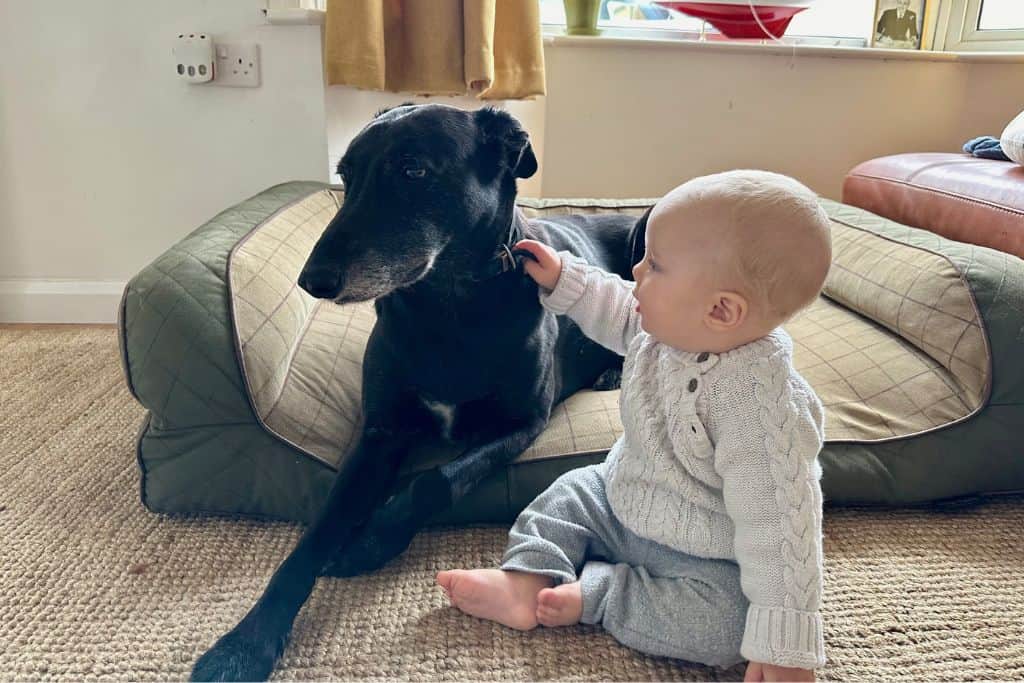
We’ve not travelled with Cav Dog, but we do have plenty of friends who do travel with their pets. The main deciding factor on this would be cost, as travelling with pets can be expensive depending on what you need to do in advance of their travel, for example to they require extra vaccines, or medical treatments.
Have a contingency plan
This sounds like an insane thing to put on a list of exciting things to think of before you travel, however, we’re really recommend having a contingency plan. During our time in Antigua, we’ve met a lot of families who have followed their dreams of taking their kids to live on boats to sail the world. They’ve then started this awesome adventure and it’s simply not worked out for one reason or another.
What would happen if one of you wasn’t enjoying the nomadic lifestyle? Some of the time I’ve met families where the mum has headed home with the kids and then joins the dad at various times around the world as the kids just don’t love being onboard. What if the children don’t love it? I’ve also met digital nomad parents who’ve suddenly realised that their children are unhappy and haven’t adapted to the lifestyle. Being prepared for challenges is important.
Tips for balancing work and travel with kids
We wanted to share a few tips on balancing work, travel and kids together using some of experiences as a starting point.
Managing a flexible work schedule
This means being able to adjust work schedules so that you can enjoy sightseeing or spending your afternoons with your children. In our experience it’s very important to communicate on how you’ll each be managing your workload and also ensuring that you have the flexibility to still enjoy time exploring the new country you’re in. It can also require a lot of flexibility from your employer to allow you to flex your work hours.
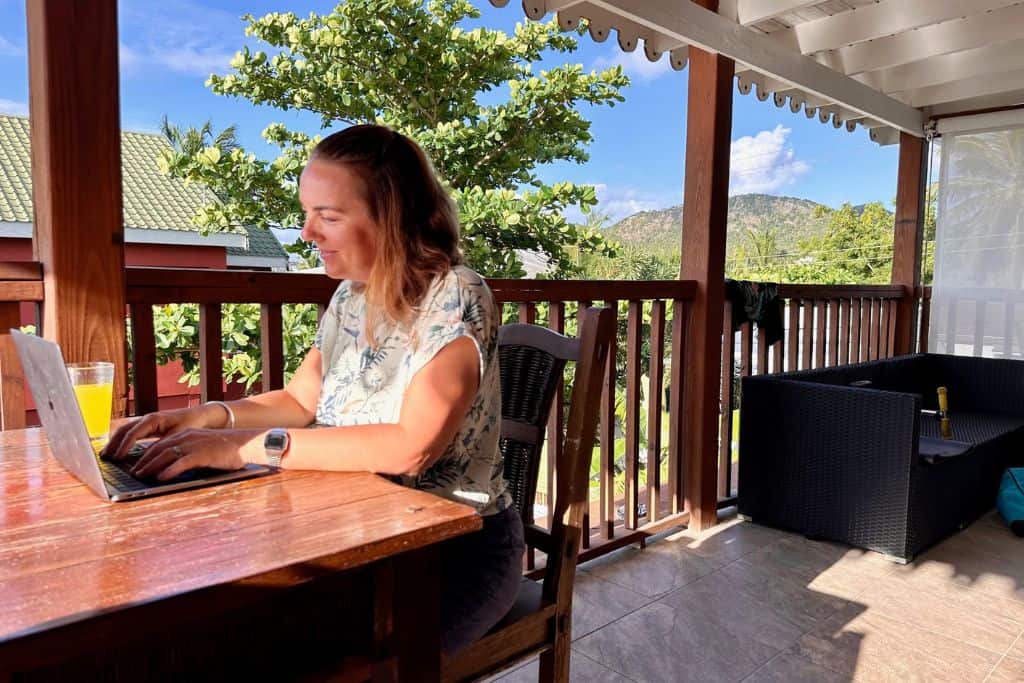
For us we choose to make it work so that when we are in Antigua we both work in the mornings whilst Cameron is at school. This means we then have the afternoons to hang out as a family. Then sometimes in the evening, Carl heads back to work to socialise with the guests onboard the yacht. It’s worked really well for us doing it this way, you’ll need to find your own rhythm.
Involving kids in planning and decision-making
Especially for older children, you’ll want to encourage them to have an input when choosing destinations or accommodations. This will give them a voice in the family’s travel plans so that they feel more engaged and involved.. This can be as simple as allowing them to discover and suggest new activities or attractions in the area to visit.
It’s been shown that when kids feel involved, they become more engaged and interested in the travelling which helps to create memorable and enjoyable experiences for everyone. Also, learning to make decisions and contribute to family choices helps to promote their independence and problem-solving skills which in itself is a valuable life lesson.
Finding a supportive community
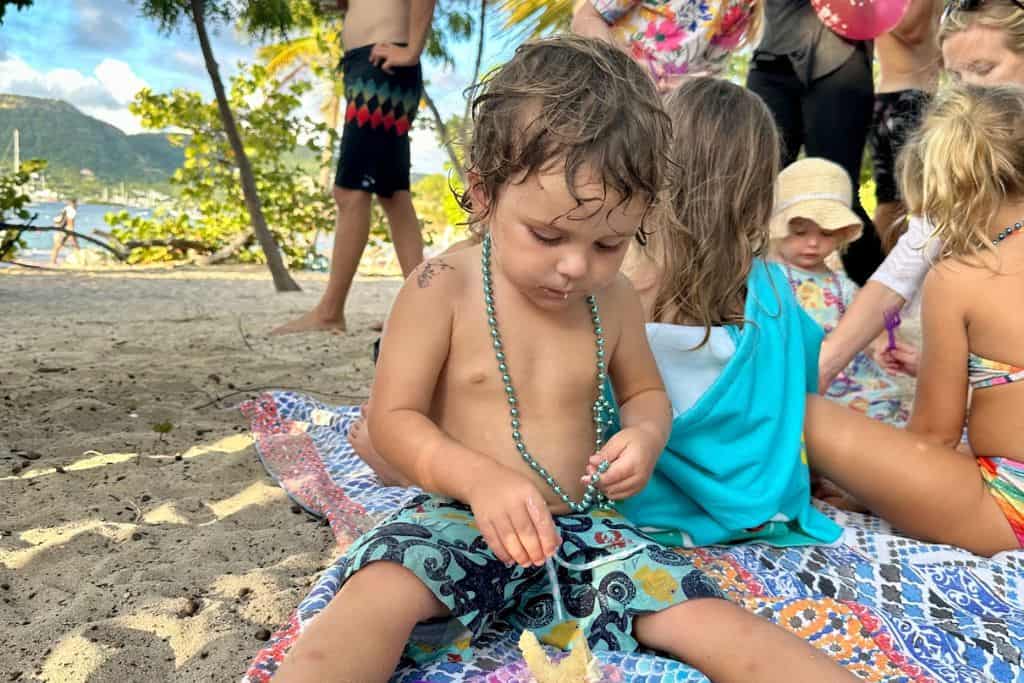
We find that it’s important to meet up with likeminded families where you share your experience, socialise and form long lasting friendships. There are a few ways to find other digital nomad families online such as online forums, social media groups, and local meet ups sites. For us, it’s worked well hanging out on the beach or play park and just chatting to families as Cameron starts to play with their kids.
If you’re on your first trip then maybe joining in a turnkey solution such as Boundless Life will offer the supportive community that you initially need.
Understand the kids perspective
We think it’s important to regularly check-in on your kids and learning how they’re finding the nomadic lifestyle experience. For us this means making sure that Cameron is enjoying the experience as much as we are. During our recent Portugal trip we sadly discovered that Cameron was missing his friends at home in the UK, and that this was making him sad.
As we were moving quite regularly we’d not really had a chance to spend so much time chatting with other kids at the play parks or on the campsite. To change this, we (the parents) introduced ourselves to families with similar aged children and asked them to have play dates with us in the play area after breakfast each morning. Once Cameron had met other kids and was playing he suddenly felt less sad.
Best destinations for digital nomad families
he great thing is that you can potentially be a digital nomad anywhere in the world. However, some countries lend themselves to it more and even encourage it by offering easy to apply for visas and even organisations to help you with the transition such as the case in Malaysia and Thailand. You’ll also want to make sure that you have the education options and accommodation choices that you’d expect.
We’ve put together a list of the countries that we hear about time and time again:
- Bali, Indonesia: A tropical paradise with a laid-back atmosphere, beautiful beaches, and a welcoming culture.
- Lisbon, Portugal: Rich in history, it offers a laid back charming blend of old-world charm and modern amenities. It also has stunning views of the Atlantic
- Chiang Mai, Thailand: Surrounded by lush landscapes, Chiang Mai is popular destination as it boasts a low cost of living, a vibrant digital nomad community, and delicious street food
- Playa del Carmen, Mexico: This family-friendly destination has white-sand beaches, vibrant markets, and a warm climate, plus is great for exploring the rest of the Yucutan region of Mexico
- Hoi An, Vietnam: This UNESCO World Heritage site enchants visitors with its lantern-lit streets, historic architecture, and tasty local cuisine
- Barcelona, Spain: Is a city that blends art, culture, and beachside relaxation which helps to make it an attractive destination for nomadic families
Final Thoughts on being a digital nomad family
Writing this post has made us realise how much we love our digital nomad family life. It’s also reminded us of the benefits and challenges that come with this lifestyle and the way that as a family we’ve been able to adapt. We really hope that we’re inspired even one family to take the leap to follow their dream
